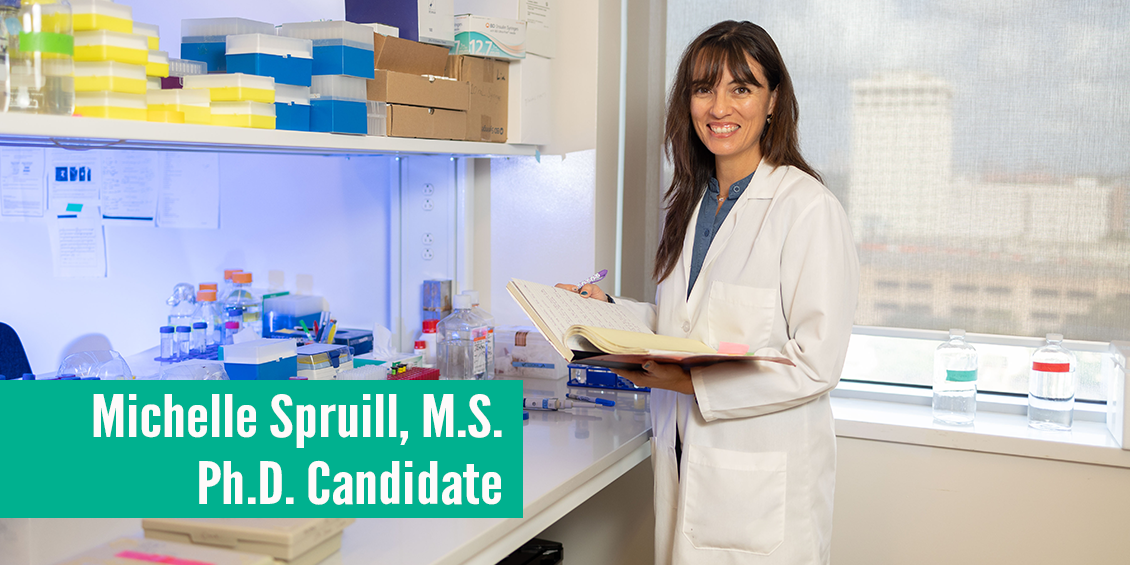From a small west Texas town with optometrist ambitions to big city dreams altering the genes of fruit flies, the educational journey of Michelle Spruill, M.S., has taken weaving pathways leading her to and through science with research as the main attraction.
As an undergraduate student majoring in biology and minoring in chemistry, Spruill started her academic journey on a pre-med track at a West Texas university. While working for an optometrist in college, however, Spruill had a realization that could have been dream-crushing but instead revealed a new path for her to follow.
Finding One's Fit
"I found out that I am not meant to be patient facing," Spruill said. "It was so much fun; the science behind it was very interesting. But I found the social aspect to be challenging. It didn’t come naturally to me; the science did."
Desiring more research experience, Spruill completed her M.S. in biology with an emphasis on genetics. Her thesis project involved altering the genetic makeup of Drosophila melanogaster, also known as the common fruit fly, which is considered a model organism for research into everything from fundamental genetics and cell signaling to cancer and neurodegenerative and muscle-wasting diseases. The project solidified what she already knew: Research was her destination.
"I like tracking research," Spruill said. "I even like the administrative part of research that most people hate, like filling out your notebook, building the PowerPoint presentations and making sure everything is filed properly."
According to Spruill, organization of research is key.
"If it's not organized, and you can't go back and find exactly what and how you performed an experiment the first time around, and what if any changes were made, then you just wasted your time," she said.
Empowered by Technology
And time, for Spruill, is incredibly valuable. In addition to graduating with her Ph.D. in the Pharmaceutical Sciences-Pharmaceutics Concentration this May, Spruill has worked in pathology laboratories as a full-time toxicologist for the past 15 years.
At her current company, she works heavily with mass spectrometry, which is also at the center of her dissertation. During her time at UH, her mass spectrometry expertise has expanded into mass spectrometry imaging (MSI). With MSI, Spruill can analyze the spatial distribution of molecules within biological tissue samples.
"It’s really come to the forefront in the last 20 years, and now people are asking, 'How can we introduce this into the clinical space?'" Spruill said. "That is a gap I really want to bridge."
Seeking How Cancer Spreads
Understanding tissue lipid makeup is imperative to her in-vivo studies with model species, as she is researching how breast cancer metastasizes into other organs, especially the brain. In addition to studying the endogenous composition of the breast cancer brain metastasis (BCBM), she is comparing that to the lipid composition of the noncancerous tissue to identify lipids that are tumor specific, with the hopes of identifying tumor-specific lipid pathways.
She is also evaluating the effect of FDA-approved therapies for breast cancer to determine their effectiveness on BCBM and the spatial distribution of each treatment in the brain tissue. Spatial distribution helps to determine if the drugs have penetrated the tissue, if they are trapped in the vasculature or if the treatment is accumulating elsewhere.
Spruill credits her graduate adviser, UHCOP Associate Professor Xinli Liu, Ph.D., for her focus on breast cancer.
"Breast cancer affects so many women across the world," Spruill said. "It’s a very interesting topic for me to delve into personally as I have family members who have been affected by breast cancer. When Dr. Liu said breast cancer was her main point of focus, I felt like all my stars had aligned and this was really a good fit for me."
As she approaches graduation, her career plans are solid: remain with her current employer with the hopes of eventually bringing MSI to the clinical space. Spruill would also like to continue collaborating with Liu on future research projects.
"The exciting days are here at UH, when you work on a lot of this research, and you start to see promising results," Spruill said.
Balance Outside the Lab
Spruill’s affinity for her graduate adviser runs beyond the research realm.
"Dr. Liu is constantly reminding me to make time for my children," Spruill said. "She tells me to make sure I stop and take care of everything at home because the work will be there waiting for me. I feel I got very lucky joining her lab."
For pharmacists who also do not feel like they are meant to be patient-facing, Spruill has this advice.
"It definitely doesn’t mean that you are not meant to be a pharmacist because there are research routes that you can go," Spruill said. "There are tons of labs looking for great, qualified pharmacists for preclinical and post-clinical studies. Don’t give up on what you really want to do."
